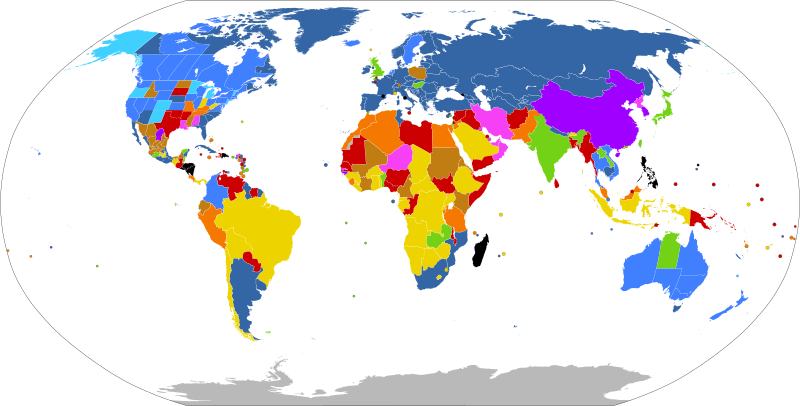ProPublica: Activists Pursue Private Abortion Details Using Public Records Laws

International Law on Abortion Laws, United Nations Report 2013
by Charles Ornstein, ProPublica
This story was co-published with the Washington Post.
A few years back, Jonathan Bloedow filed a series of requests under Washington state's Public Records Act asking for details on pregnancies terminated at abortion clinics around the state.
For every abortion, he wanted information on the woman's age and race, where she lived, how long she had been pregnant and how past pregnancies had ended. He also wanted to know about any complications, but he didn't ask for names. This is all information that Washington's health department, as those in other states, collects to track vital statistics.
What has been your experience with patient privacy? Do you think your medical information was shared by your doctor or health-care provider? Do you think it was involved in a breach? Tell us your story.
Bloedow, 43, isn't a public health researcher, a traditional journalist or a clinic owner. He's an anti-abortion activist who had previously sued Planned Parenthood, accusing the group of overcharging the government for contraception.
"There are stories in the data that bring home the reality of what these people do," Bloedow, a software engineer, said in an email. "Any good investigator knows that when you're dealing with hard-core criminals, if you ‘keep crawling through their garbage' some evidence of criminality and corruption will turn up."
The health department had already given him data for one provider, he said, and was on the verge of turning over more information when Planned Parenthood and other clinics sued, arguing that releasing the records would violate health department rules and privacy laws.
The legal skirmish, and others like it nationwide, reveal a quiet evolution in the nation's abortion battle. Increasingly, abortion opponents are pursuing personal and medical information on women undergoing abortions and the doctors who perform them. They often file complaints with authorities based on what they learn.
Abortion opponents insist their tactics are generally not aimed at identifying women who have abortions but to uncover incidents involving patients who may have been harmed by poor care or underage girls who may have been sexually abused. They say they are trying to prevent situations such as the one involving Philadelphia abortion doctor Kermit Gosnell, who was convicted in 2013 of murdering three babies after botched abortions and of involuntary manslaughter in the death of a woman.
"This is about saving the lives of women," said Cheryl Sullenger, senior policy adviser for the anti-abortion group Operation Rescue, which is based in Wichita, Kansas. "A lot of people don't understand that. It's a systemic problem within the abortion industry today for abortion providers to cut corners on patient care."
But those who support abortion rights say the ultimate aim of these activists is to reduce abortions by intimidating women and their doctors — using the loss of privacy as a weapon. They say their opponents are amassing a wealth of details that could be used to identify patients — turning women, and their doctors, into pariahs or even targets. In a New Mexico case, a woman's initials and where she lived became public as part of an investigation triggered by a complaint from activists.
"I don't think there's any margin for error here," said Laura Einstein, chief legal counsel of Planned Parenthood of the Great Northwest and the Hawaiian Islands, which challenged Bloedow's request. "These women came to a private health center to have a private health procedure, and that's just not anybody's business."
In recent years, abortion opponents have become experts at accessing public records such as recordings of 911 calls, autopsy reports and documents from state health departments and medical boards, then publishing the information on their websites.
More Articles
- Department of Labor Awards $5M to Train, Expand Pathways for Women for Registered Apprenticeships, Nontraditional Occupations
- Rose Madeline Mula Writes: I’ve Got A Secret – NOT!
- Stateline: Fearing Delays and Chaos, Swing States Weigh Early Counting of Mail-In Ballots
- Women's Congressional Weekly Legislative Update: Paycheck Protection Program Restrictions, Child Care Grants, Pandemic Unemployment Assistance
- England's Information Commissioner's Office, Publishes Code to Protect Children’s Privacy Online: "We need our laws to protect children in the digital world too”
- Young Women Still May Be Getting Unnecessary Pelvic Exams; UCSF and CDC Study Finds Millions of "Outdated" Tests Being Performed on Healthy Females 15 to 20 Years Old
- Women Exposed to Persistent Organic Pollutants Had Slightly Smaller Fetuses than Women Who Haven’t Been Exposed
- Weekly National Summary of Week 50: Outpatient Illness Surveillance, Geographic Spread, Mortality Surveillance
- States Flubbed the Rollout of Their Health Insurance Exchanges. Now They’re Ready to Try Again
- STATELINE: How Disaster Warnings Can Get Your Attention






